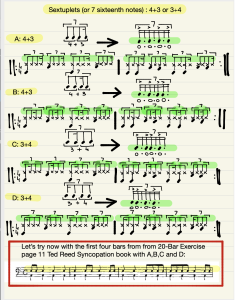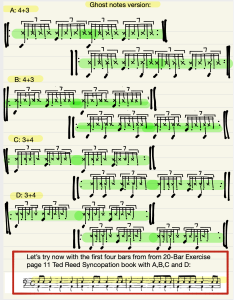Grooving with septuplets: part one.
28-03-2024
In this instance in the release of Tigran Hamasyan’s CD «
The call within » the piece « Levitation 21 » caught my attention and gave me the idea to write a new lesson with would be an initiation to accompany with septuplets.
In this song, in this particular piece and as per usual Arthur Hnatek plays in an extraordinary way he is so at ease with this style of music.
Generally when you’re playing in 7/8, you would count in following groups of notes:
2+2+3 or 2+3+2 or 3+2+2.
As for the septuplets, since you play these faster, you would then have to count differently, in two unequal parts with will create a sway to it will be easy to adapt.Therefore you would count it more this way, at least that’s my suggestion:
4+3 or 3+4.
What changes here is the group of 3 notes, it can be: 2+1 or 1+2.
The group of 4 will always be played: 2+2 but think of it as group of 4.
This lesson is divided into two parts. First one is easy because the exercises are played in a simple way, the second one is less so because we add gosh notes.
Each part has four rhythmic examples by their application in a four bar phrase with music.


https://youtu.be/2Ra_QtD0OCg
In this instance in the release of Tigran Hamasyan’s CD «
The call within » the piece « Levitation 21 » caught my attention and gave me the idea to write a new lesson with would be an initiation to accompany with septuplets.
In this song, in this particular piece and as per usual Arthur Hnatek plays in an extraordinary way he is so at ease with this style of music.
Generally when you’re playing in 7/8, you would count in following groups of notes:
2+2+3 or 2+3+2 or 3+2+2.
As for the septuplets, since you play these faster, you would then have to count differently, in two unequal parts with will create a sway to it will be easy to adapt.Therefore you would count it more this way, at least that’s my suggestion:
4+3 or 3+4.
What changes here is the group of 3 notes, it can be: 2+1 or 1+2.
The group of 4 will always be played: 2+2 but think of it as group of 4.
This lesson is divided into two parts. First one is easy because the exercises are played in a simple way, the second one is less so because we add gosh notes.
Each part has four rhythmic examples by their application in a four bar phrase with music.


https://youtu.be/2Ra_QtD0OCg


 https://youtu.be/2Ra_QtD0OCg
https://youtu.be/2Ra_QtD0OCg
 https://youtu.be/2Ra_QtD0OCg
https://youtu.be/2Ra_QtD0OCg